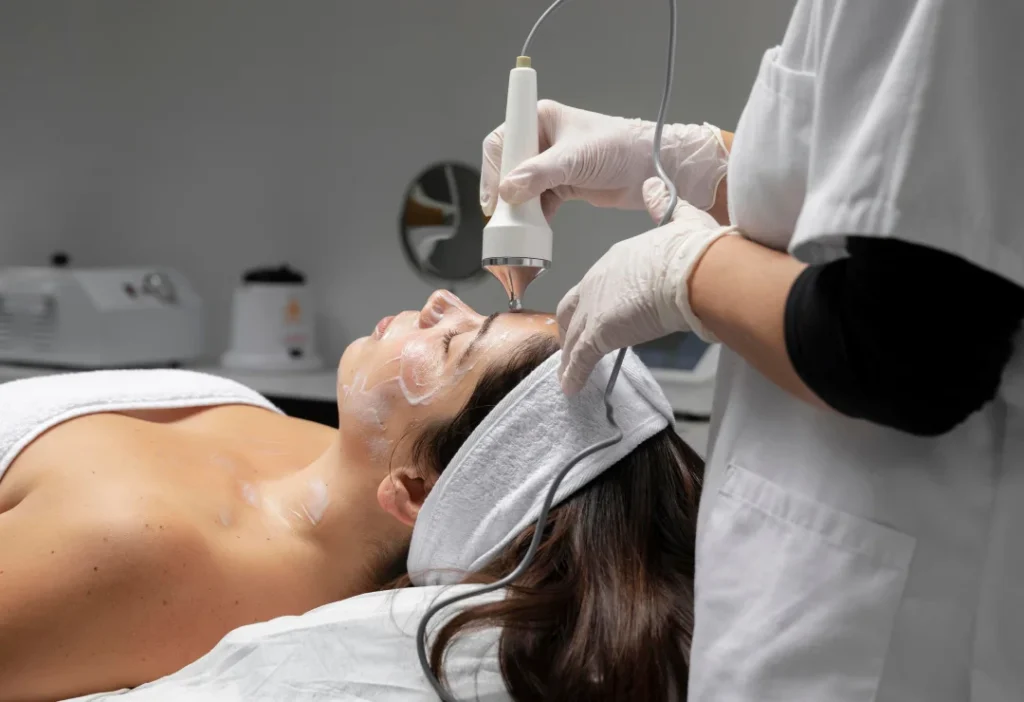Chemical peels are a non-invasive skin rejuvenation treatment designed to improve the appearance and texture of the skin by exfoliating the outermost layers. This process uses a specialized chemical solution that stimulates the natural shedding of dead skin cells, promoting the growth of fresh, smoother, and healthier skin. Chemical peels can effectively address concerns such …

About Chemical Peels
Chemical peels are a safe and effective skin treatment designed to improve your skin’s texture, tone, and overall appearance. By applying a specialized chemical solution to the skin, the treatment removes the damaged outer layers, revealing fresher, smoother, and more radiant skin underneath. Chemical peels can help reduce fine lines, acne scars, dark spots, sun damage, and uneven skin tone, making them a versatile option for a variety of skin concerns.
There are different types of chemical peels—light, medium, and deep—each tailored to target specific concerns and skin types. Light peels offer a gentle refresh with minimal downtime, while deeper peels provide more dramatic results for concerns like deeper wrinkles or significant pigmentation issues. After the treatment, you may experience some redness and peeling as your skin heals and regenerates, leading to a clearer, brighter complexion.
Whether you’re looking to smooth fine lines, fade acne scars, or simply refresh your skin, chemical peels provide a customizable solution that promotes healthier, more youthful-looking skin. A consultation with our skincare specialist will help determine the right peel for your unique skin needs and desired results.
How Chemical Peels Works
Exfoliating the Skin’s Surface
Chemical peels use a specially formulated solution that is applied directly to the skin, causing the outermost layers to break down and exfoliate. This controlled exfoliation removes dead skin cells, debris, and damaged skin, making way for new, healthier skin to surface.
Stimulating Skin Regeneration
As the old skin layers shed, the body’s natural healing process is activated. This stimulates the production of collagen and elastin, essential proteins that improve skin texture, firmness, and elasticity, leading to a smoother and more youthful appearance.
Targeting Specific Skin Concerns
Different chemical peels are designed to target specific concerns. Light peels gently treat fine lines and uneven texture, while medium and deep peels penetrate deeper layers to address acne scars, hyperpigmentation, and more severe wrinkles.
Promoting Clearer Pores & Acne Reduction
Chemical peels help unclog pores, reduce oil buildup, and decrease acne-causing bacteria, making them an effective option for individuals struggling with acne or acne scars.
Gradual Peeling & Skin Renewal
Following the treatment, the skin may peel over a few days as it sheds the outer layers. This process reveals smoother, brighter, and clearer skin underneath, with long-lasting improvements in texture and tone.
The Result of a Chemical Peel
After a chemical peel, you can expect skin that feels smoother, looks brighter, and appears more even-toned. Depending on the strength of the peel, results can range from a subtle refresh to a significant transformation, all while promoting long-term skin health.

Candidates for Chemical Peels
- Individuals with Uneven Skin Tone & Texture
- Those Struggling with Acne & Acne Scars
- People with Hyperpigmentation & Dark Spots
- Anyone Looking to Minimize Fine Lines & Wrinkles
- Individuals with Sun-Damaged Skin
- Those Wanting Smoother, More Radiant Skin
- People with Enlarged Pores or Oily Skin
- Patients Preparing for Major Aesthetic Treatments
Chemical peels are a versatile treatment suitable for a wide range of skin types and concerns. Whether you want to smooth fine lines, fade acne scars, or simply achieve a brighter complexion, a personalized peel can help you reach your skincare goals. A consultation with a skincare specialist will help determine the best peel strength and formula for your unique skin needs.
Success Stories
More than 40 five-star reviews on Google
EXCELLENTTrustindex verifies that the original source of the review is Google. I had an amazing experience at WRTX-Memorial for my HydraFacial treatment! From the moment I walked in, the staff was welcoming and professional, making me feel completely at ease. The HydraFacial itself was incredibly relaxing and my skin has never looked better! It felt refreshed, hydrated, and glowing. The technician was knowledgeable, explained everything thoroughly, and customized the treatment to suit my skin's needs. I left feeling rejuvenated and pampered. Highly recommend this place for anyone looking for top-notch skincare! Five stars all the way!Posted onTrustindex verifies that the original source of the review is Google. Worth every penny you pay for the service. Had 1 session and feel relaxed , so thankful to themPosted onTrustindex verifies that the original source of the review is Google. I was gifted a session for the float pod. Got there during business hours (10:08 am). Rang the doorbell and called 2 times with no response. I live 52 minutes away!! So disappointed. UPDATE: Got a very quick response and scheduled a session!!! Love a business who is willing to work with and accommodate customers!!!Posted onTrustindex verifies that the original source of the review is Google. I had a really relaxing experience doing the float therapy! Thank you so much, I enjoyed it and it felt like I had a weighted blanket on somehow hahaPosted onTrustindex verifies that the original source of the review is Google. If I had a bad experience, I’d normally just keep it to myself but today is the exception. I booked an appointment for December 2 2023 at 4:30pm for my wife and I. It was our 12 year marriage anniversary and I planned a day of rest and relaxation for just the two of us. I booked an appointment just before 1pm the day before for Saturday the next day… Float, Spa, entertainment and picnic for the day was the plan. We made it to the location 15 minutes early and no one was there. Rang the doorbell, nothing. Called the facility 6 separate times, still no answer. The only response if got was for a person named Lisa from the “contact us” portion of their website. We waited until 4:30, nothing or no one. And finally at 30 minutes past, decided to leave. Maybe it wouldn’t have been such a big deal to have a missed appointment if it wasn’t for this occasion or if we live closer but we live 45 minutes away if there’s no traffic… for all the others that gave this place 5 stars, I’m glad you all had a great experience but ours was never allowed to happen. ⭐️ 1 star for this place for not honoring the appointment, absence of communication, the Inconvenience of my wife and I driving such a long way to visit, and ruining the very first stop of our anniversary day.Posted onTrustindex verifies that the original source of the review is Google. My husband and I enjoyed float therapy for the first time. Everything was very clean, the showers were really nice, and the soap/shampoo/conditioner was really good quality.Posted onTrustindex verifies that the original source of the review is Google. What an awesome experience!!! Kari was extremely knowledgeable and helpful, she answered all my questions and took me on a tour of the wonderful facility, which was also super clean. This was my first time trying cryotherapy and it won't be my last, my back and knees feel rejuvenated, I will definitely come back here soon!Posted onTrustindex verifies that the original source of the review is Google. So I went to check this place out and when I walked in this young lady Kary was there and was so nice and kind and made me feel welcomed. She is stil nice. I was looking for a healthy natural way to heal my body and to relax, and I think this is the place I've being looking for. I am feeling much better after visiting their sauna and using compression boots. Every one here is very nice. I met Dr. Patel too, who was very friendly and wanted to help all their customers. I recomend this place to any one.Posted onTrustindex verifies that the original source of the review is Google. Giovanni is incredibly well educated and informed about IV infusions. These aren’t just ‘feel better after a hangover’ (though I’m sure he’s quite good at that too. My son has a chronic illness, and these IVs are helping him to feel better and absorb the nutrients that he can’t through just eating and drinking. Thanks for working so hard to help him improve and gain strength and energy.Verified by TrustindexTrustindex verified badge is the Universal Symbol of Trust. Only the greatest companies can get the verified badge who has a review score above 4.5, based on customer reviews over the past 12 months. Read more
have a question?
Quick answers to Chemical Peel questions you may have
What skin concerns can chemical peels help with?
Chemical peels can treat acne scars, fine lines, wrinkles, hyperpigmentation, sun damage, enlarged pores, uneven skin tone, and dull skin.
Are chemical peels safe?
Yes, chemical peels are safe when performed by trained professionals. The strength of the peel is customized based on your skin type and concerns to minimize risks and ensure optimal results.
Will my skin peel after the treatment?
Mild peeling or flaking is common, especially with medium and deep peels. The extent of peeling depends on the type of peel used. Light peels may have little to no visible peeling.
How long does the treatment take?
A typical chemical peel takes 30 to 45 minutes, making it a quick, in-office treatment with minimal downtime.
Is there downtime after a chemical peel?
Light peels usually have no downtime, while medium and deep peels may require a few days of healing. Redness, mild peeling, and flaking are normal and part of the skin renewal process.
How often should I get a chemical peel?
The frequency depends on your skin goals and the type of peel. Light peels can be done every 4–6 weeks, while deeper peels may be recommended once or twice a year.
Who is a good candidate for chemical peels?
Anyone looking to improve skin texture, tone, acne scars, or sun damage can benefit. A consultation will determine the best type of peel for your skin type and concerns.
How soon will I see results?
You’ll notice brighter, smoother skin within a few days of a light peel. Medium to deep peels may take longer to fully heal but offer more dramatic results over time.



